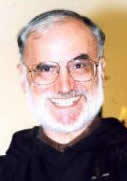An ancient custom for the feast of Christmas foresees three Masses, called respectively "at night," "at dawn," "during the day." In each Mass, through readings that vary, a different aspect of the mystery is presented, in such a way that we get, so to speak, a three-dimensional vision.
The Gospel of the Mass at night focuses on the event, on the historical fact. This is described with disconcerting simplicity, without any apparatus -- three or four lines of humble and familiar words to describe the absolutely most important event in the history of the world, the coming of God to earth.
The task of bringing to light the significance and importance of this event is given, by the Evangelist, to the song intoned by the angels, after having made proclamation to the shepherds: "Glory to God in the highest and on earth peace to those on whom his favor rests." In the past this expression was translated differently, that is, as "Peace on earth to men of good will." In these words the expression entered into the Gloria and it became common in Christian language. After Vatican II this expression was used to indicate all the honest, who seek the true and the common good, whether or not they be believers.
But it is an inexact translation and for this reason it has been abandoned today. In the original biblical text it is a matter of men who are loved by God, who are the object of the divine good will, not that they themselves are gifted with good will. In this way the proclamation becomes more consoling. If peace were accorded to men on account of their good will, then it would be limited to a few, to those who merit it; but since it is accorded through God's good will, through grace, it is offered to all. Christmas is not an appeal to the good will of men but a radiant proclamation of the good will of God toward men.
The key word, then, for understanding the angelic proclamation is the last one, that which speaks of the "favor" of God toward men, as font and origin of all that which God began to accomplish at Christmas. He predestined us to be his adopted sons "in accord with the favor of his will," the apostle writes; he made known to us the mystery of his will, according to what he foreordained "in accord with his favor" (Ephesians 1:5,9). Christmas is the supreme epiphany of that which the Scripture calls God's philanthropy, that is, his love for men: "The goodness of God and his love for men are manifested" (Titus 3:4).
Only after having contemplated the "good will" of God toward us can we concern ourselves also with the "good will" of men, that is, with our response to the mystery of Christmas. This good will must be expressed through imitation of God's action. Imitating the mystery that we celebrate means abandoning every thought of justifying ourselves on our own, every remembrance of wrongs done to us, erasing from our hearts all resentment toward others, even justified resentment. It means not willingly allowing any hostile thought against anyone, whether against neighbors or those far away, the weak, the strong, the little, the great of the earth, or against any creature that exists in the world. This is what it means to honor the birth of the Lord, because God did not hold onto any rancor, he did not look at the wrong done to him, he did not wait for others to take the first step to him. If this is not always possible during the rest of the year, let us at least do it at Christmas. Thus Christmas will be truly the feast of goodness.
[Translation by Joseph G. Trabbic]

Fr.
Raniero Cantalamessa is a Franciscan
Capuchin Catholic Priest. Born in Ascoli Piceno,
Italy, 22 July 1934, ordained priest in 1958.
Divinity Doctor and Doctor in classical literature.
In 1980 he was appointed by Pope John Paul II
Preacher to the Papal Household in which capacity he
still serves, preaching a weekly sermon in Advent
and Lent.
